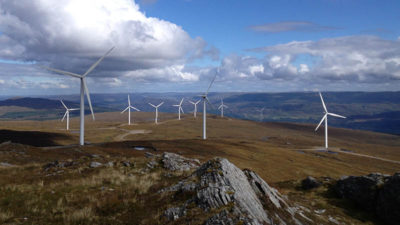Germany’s largest private sector bank has announced a new policy for fossil fuel investment and a new criteria for classifying ESG financing.
Deutsche Bank has adopted a new Fossil Fuels Policy which provides its business divisions with a strict framework for their business activities involving coal, oil and gas. This means that Deutsche Bank will end its global business activities in coal mining by 2025. This Policy covers financing as well as capital market transactions. Previously, the bank had set itself a three-year objective of reducing its loan exposures to coal-fired power plants by 20 percent. It achieved this goal at the end of 2019.
In addition, Deutsche Bank has signed the so-called Equator Principles – a risk management framework for assessing the environmental and social risk of financing projects. The principles ensure that strict environmental and social standards are applied during the project development and construction process, including follow-up monitoring. Having already adopted the World Bank Group’s International Finance Cooperation’s (IFC) performance standards, Deutsche Bank’s due diligence process is already indirectly in line with the Equator Principles in the majority of cases.
The bank will review its client relationships in Europe and the US by the end of 2020. In Asia, the review will start in 2022.
The bank’s new policy will see it drop clients with either a coal share of revenue or a coal share of reserves of more than 50 per cent by 2025. However, it is unclear whether this policy will exclude large diversified companies such as BHP Billiton, Anglo American and Glencore.
For coal using energy companies, the bank has announced it will be assessing their transition plans by the end of this year, this will again only apply to companies with a coal share of power generation or coal powered capacity of more than 50 per cent. This deadline could give major utilities companies such as Germany’s RWE and Poland’s PGE time to phase their transition over time and remain in the bank’s portfolio. Although both companies are leading lignite miners, as utilities companies they rarely generate any revenue from selling coal.
BankTrack believe that compared to competitors the bank is still lagging behind on climate. For example, French company BNP Paribas has recently released strict criteria for company finance and UK-based RBS intends to exit coal entirely by 2030. Since this year, companies with a coal share of revenue of more than 15 per cent must share a coal exit plan if they want to remain clients of RBS.
Regarding the oil and gas sector, Deutsche Bank excludes project finance for new oil sand projects, new arctic drilling projects and fracking in countries with severe water stress. In addition, the bank intends to review oil and gas companies plans to reduce carbon intensity. The bank plans to use this as a basis to formulate reduction goals for such companies as a second step.
''Deutsche Bank’s oil and gas policies could become a really solid starting point for further climate action. Any serious fossil fuel exit plan has to invariably result in the exclusion of climate destructive business models, such as those of RWE, Glencore and Exxon,'' commented Regine Richter, Energy Campaigner at Urgewald.
The bank has also released details of its new criteria for classifying ESG financing, including a taxonomy, that aligns it with the Green Bond Principles and the Social Bond Principles of the International Capital Market Association (ICMA) as well as the EU Taxonomy.
The bank will immediately effect conduct its sustainable finance and sustainable financial product activities in accordance with its new Sustainable Finance Framework. According to the targets published by the bank in May it plans to increase its volume of sustainable financing and portfolio of ESG investments under management to over €200bn euros by the end of 2025.
The new Sustainable Finance Framework defines a global process and creates Group-wide rules for the criteria which the bank may use in future to classify fixed-income and securities transactions, capital market products and financing offers as sustainable. The Framework stipulates sector-specific thresholds and eligibility criteria, as well as the environmental and social criteria that apply to the due diligence process for sustainable finance.
Deutsche Bank CEO Christian Sewing explained the logic: “This Sustainable Finance Framework is one precondition for enabling us to become a trailblazer in this area in the financial sector. It helps us provide our clients with the clarity they need and the guidance they require regarding ESG financing and ESG financial products – including their own transformation to a sustainable business model.”
Deutsche Bank has said that it will continue to work together with other global banks as part of the joint Finance Initiative of the United Nations Environmental Programme's and the European Banking Federation to develop a common approach for implementing the EU Taxonomy.
Latest News
-
Motorway services firm to fundraise for air ambulances
-
Pets at Home’s charitable arm helps assistance dogs charity to expand
-
Airport hands local charities and groups £100,000 over last year
-
Private health provider awards £10,000 to arthritis research team
-
Building Society hands out £1m to tackle inequality
-
Premier League and Comic Relief partnership aims to improve children’s mental health
© 2019 Perspective Publishing Privacy & Cookies







Recent Stories